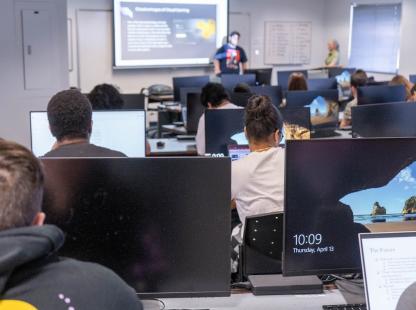
Student Research Opportunities
You're never too young to do research!
The professors of Ying Wu College of Computing are always looking for students to help with their research.
Don't worry about "not being ready" for research. We have a 9th grade high school student taking part in Social Media research. Don't even worry if you are not sure what "doing research" means. You will learn it -- by doing it.
You'll need a working knowledge of one common programming language--for example, Java, C, C++, Python, JavaScript or R--and a good work attitude. Be on time for meetings, reply to email messages from your professor, tell your professor if you run into problems (including private problems) or if you don't understand your assignments, do what your professors assigns you, and make a little progress every week.
Why do research?
We professors do research because it is fun. Hopefully, you will also feel the fun and excitement of doing something new that nobody has ever done before.
Even more importantly, you can put your research on your resume. You can talk about it at job interviews and impress your interviewer, and it will prepare you for jobs where you are expected to do research. That widens the range of possible jobs you can take.
Academic Credit or Payment?
Projects can be done for payment (if funding is available) or for academic credit.
Contact the supervisor for more details and the timeline.
Academic credit can be obtained by enrolling in one of the following courses:
- CS 488 or DS 488 or IS 488 (Independent study for Undergraduates)
- CS 725 or DS 725 or IS 725 (Graduate Research 1)
- CS 726 DS 726 or IS 726 (Graduate Research 2)
- CS 700B DS 700B or IS 700B (MS Project - 3 hours)
- CS 701B or 701B or IS 701B (MS Thesis - 3 hours -taken after 700B)
CS 488, IS 488, DS 488, CS 700B, DS 700B, IS 700B, CS 701B, DS 701B IS 701B - Permit required
CS 725, DS 725, IS 725, CS 726, DS 726, IS 726 - Speak with your Ph.D. advisor
REGISTER
Topic 1: Applied AI and LLM. AI for Finance, Law, Art and Design, Psychology (mental health or well-being), marketing and transportation.
Topic 2: Cryptocurrency and Web3
Supervisor: Grace Wang
Email: guiling.wang@njit.edu
Website: guilinggracewang.github.io
Computing program functions
Supervisor: Ali Mili
Email: mili@njit.edu
Website: people.njit.edu/profile/mili
Topic 1: Deep Reinforcement Learning for Influence Maximization Topic 2: Neural Combinatorial and Constrained Optimization
Supervisor: Shivvrat Arya
Email: sa3339@njit.edu
Website: https://shivvrat.github.io/
Topic 1: Foundations of transfer reinforcement learning
Topic 2: Foundations of Learning against Adaptive Adversaries
Supervisor: Thanh Nguyen-Tang
Email: tn294@njit.edu
Website: https://thanhnguyentang.github.io/
Topic 1: Generative AI and Augmented/Virtual Reality
Topic 2: End-user Programming in Augmented Reality
Supervisor: Lei Zhang
Email: lz392@njit.edu
Website: https://raynez.art/bio/
Human-centered security and privacy
Supervisor: Nathan Malkin
Email: nathan.malkin@njit.edu
Website: https://malk.in
Topic 1: Info chess
Topic 2: Hard vs soft representation spaces
Supervisor: Kieran Murphy
Email: km982@njit.edu
Website: kieranamurphy.com
Ontology editing in Virtual Reality (Unity programming or Human Study design)
Supervisor: James Geller
Email: geller@njit.edu
Website: web.njit.edu/~geller
Parallel graph analytics
Supervisor: David Bader
Email: bader@njit.edu
Website: https://davidbader.net
Secure cloud data processing
Supervisor: Shantanu Sharma
Email: ss797@njit.edu
Website: https://web.njit.edu/~ss797/
Topic 1: Type-directed slicing
Topic 2: Practical Search-based Type Inference
Supervisor: Martin Kellogg
Email: mjk76@njit.edu
Website: https://web.njit.edu/~mjk76/
XR Research
Supervisor: Margarita Vinnikov
Email: vinnikov@njit.edu
Website: https://people.njit.edu/profile/vinnikov